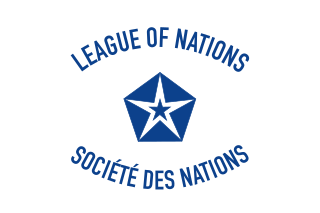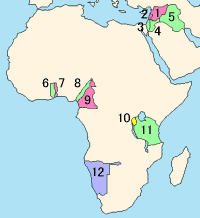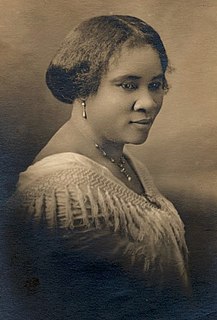Related Research Articles

The League of Nations, was the first worldwide intergovernmental organisation whose principal mission was to maintain world peace. It was founded on 10 January 1920 by the Paris Peace Conference that ended the First World War. The main organization ceased operations on 20 April 1946 but many of its components were relocated into the new United Nations.

A League of Nations mandate was a legal status for certain territories transferred from the control of one country to another following World War I, or the legal instruments that contained the internationally agreed-upon terms for administering the territory on behalf of the League of Nations. These were of the nature of both a treaty and a constitution, which contained minority rights clauses that provided for the rights of petition and adjudication by the Permanent Court of International Justice.

The Treaty of Versailles was the most important of the peace treaties that brought World War I to an end. The Treaty ended the state of war between Germany and the Allied Powers. It was signed on 28 June 1919 in the Palace of Versailles, exactly five years after the assassination of Archduke Franz Ferdinand, which led to the war. The other Central Powers on the German side signed separate treaties. Although the armistice, signed on 11 November 1918, ended the actual fighting, it took six months of Allied negotiations at the Paris Peace Conference to conclude the peace treaty. The treaty was registered by the Secretariat of the League of Nations on 21 October 1919.

Thomas Woodrow Wilson was an American politician and academic who served as the 28th president of the United States from 1913 to 1921. A member of the Democratic Party, Wilson served as the president of Princeton University and as the governor of New Jersey before winning the 1912 presidential election. As President, Wilson changed the nation's economic policies and led the United States into World War I in 1917. He was the leading architect of the League of Nations, and his progressive stance on foreign policy came to be known as Wilsonianism.

Henry Cabot Lodge was an American Republican politician, historian, and statesman from Massachusetts. He served in the United States Senate from 1893 to 1924 and is best known for his positions on foreign policy. His successful crusade against Woodrow Wilson's Treaty of Versailles ensured that the United States never joined the League of Nations and his reservations against that treaty influenced the structure of the modern United Nations.

Foreign Affairs is an American magazine of international relations and U.S. foreign policy published by the Council on Foreign Relations, a nonprofit, nonpartisan, membership organization and think tank specializing in U.S. foreign policy and international affairs. Founded on 15 September 1922, the print magazine is currently published every two months, while the website publishes articles daily and anthologies every other month.

The Paris Peace Conference was the formal meeting in 1919 and 1920 of the victorious Allies after the end of World War I to set the peace terms for the defeated Central Powers. Dominated by the leaders of Britain, France, the United States and Italy, it resulted in five treaties that rearranged the maps of Europe and parts of Asia, Africa and the Pacific Islands, and also imposed financial penalties. Germany and the other losing nations had no voice in the Conference's deliberations; this gave rise to political resentments that lasted for decades.

Madam C.J. Walker was an African American entrepreneur, philanthropist, and political and social activist. She is recorded as the first female self-made millionaire in America in the Guinness Book of World Records. Multiple sources mention that although other women might have been the first, their wealth is not as well-documented.

The causes of World War II, a global war from 1939 to 1945 that was the deadliest conflict in human history, have been given considerable attention by historians from many countries who studied and understood them. The immediate precipitating event was the invasion of Poland by Nazi Germany on September 1, 1939, and the subsequent declarations of war on Germany made by Britain and France, but many other prior events have been suggested as ultimate causes. Primary themes in historical analysis of the war's origins include the political takeover of Germany in 1933 by Adolf Hitler and the Nazi Party; Japanese militarism against China, which led to the Second Sino-Japanese War; Italian aggression against Ethiopia, which led to the Second Italo-Ethiopian War and Germany's initial success in negotiating the Molotov–Ribbentrop Pact with the Soviet Union to divide the territorial control of Eastern Europe between them.

In the history of the 20th century, the interwar period lasted from 11 November 1918 to 1 September 1939, the end of the First World War to the beginning of the Second World War. The interwar period was relatively short, yet featured many significant social, political, and economic changes throughout the world. Petroleum-based energy production and associated mechanisation led to the prosperous Roaring Twenties, a time of both social mobility and economic mobility for the middle class. Automobiles, electric lighting, radio, and more became common among populations in the developed world. The indulgences of the era subsequently were followed by the Great Depression, an unprecedented worldwide economic downturn that severely damaged many of the world's largest economies.

The Ministry of Foreign Affairs is the Polish government department tasked with maintaining Poland's international relations and coordinating its participation in international and regional supra-national political organisations such as the European Union and United Nations. The head of the ministry holds a place in the Council of Ministers.

Wilsonianism or Wilsonian idealism describes a certain type of foreign policy advice. The term comes from the ideas and proposals of President Woodrow Wilson (1913–1921). He issued his famous Fourteen Points in January 1918 as a basis for ending World War I and promoting world peace. He was a leading advocate of the League of Nations to enable the international community to avoid wars and end hostile aggression. Wilsonianism is a form of liberal internationalism.
Ethnic interest groups in the United States are ethnic interest groups within the United States which seek to influence the foreign policy and, to a lesser extent, the domestic policy of the United States for the benefit of the foreign "ethnic kin" or homeland with whom the respective ethnic groups identify.

In expansionism, states expand their territory through military empire-building or colonialism.

The United States and South Africa currently maintain bilateral relations with one another. The United States and South Africa have been economically linked to one another since the late 18th century which has continued into the 21st century. U.S. and South Africa relations faced periods of strain throughout the 20th century due to the segregationist, white rule in South Africa, from 1948 to 1994. Following apartheid in South Africa, the U.S. and South Africa have developed a strategically, politically, and economically beneficial relationship with one another and currently enjoy "cordial relations" despite "occasional strains". South Africa remains the United States' largest trading partner in Africa as of 2019.
Ghanaian Americans are an ethnic group of Americans of full or partial Ghanaian ancestry or Ghanaian immigrants who became naturalized citizen of the United States.

This article covers worldwide diplomacy and, more generally, the international relations of the great powers from 1814 to 1919. The international relations of minor countries are covered in their own history articles. This era covers the period from the end of the Napoleonic Wars and the Congress of Vienna (1814–15), to the end of the First World War and the Paris Peace Conference.
International relations (1919–1939) covers the main interactions shaping world history in this era, with emphasis on diplomacy and economic relations. The coverage here follows the diplomatic history of World War I and precedes the diplomatic history of World War II. The important stages of interwar diplomacy and international relations included resolutions of wartime issues, such as reparations owed by Germany and boundaries; American involvement in European finances and disarmament projects; the expectations and failures of the League of Nations; the relationships of the new countries to the old; the distrustful relations of the Soviet Union to the capitalist world; peace and disarmament efforts; responses to the Great Depression starting in 1929; the collapse of world trade; the collapse of democratic regimes one by one; the growth of economic autarky; Japanese aggressiveness toward China; Fascist diplomacy, including the aggressive moves by Mussolini's Italy and Hitler's Germany; the Spanish Civil War; the appeasement of Germany's expansionist moves toward the Rhineland, Austria, and Czechoslovakia, and the last, desperate stages of rearmament as another world war increasingly loomed.

Namibia–Turkey relations are the foreign relations between Namibia and Turkey. Turkey has an embassy in Windhoek since January 4, 2012.
The United Kingdom and the League of Nations played central roles in the diplomatic history of the interwar period 1920-1939 and the search for peace. British activists and political leaders help plan and found the League of Nations, provided much of the staff leadership, and Britain played a central role in most of the critical issues facing the League. The League of Nations Union was an important private organization that promoted the League in Britain. By 1924 the League was broadly popular and was featured in election campaigns. The Liberals were most supportive; the Conservatives least so.. From 1931 onward, major aggressions by Japan, Italy, Spain and Germany effectively ruined the League in British eyes.
References
- ↑ Johnson, Benita (2007). "African-Americans and American Foreign Policy "Voices in the Wilderness: The Role and Influences of African-American Citizens in the Development and Formation of Foreign Policy 1919-1944"". The Journal of Pan African Studies. 1 (8): 33–51.